Vegan Mexican cuisine is kind of having a moment in Orange County.
At its core, veganism is a lifestyle that excludes the exploitation of animals for food, clothing or any other purpose, but the introduction of plant-based and mock meats to the mainstream has allowed those who aren’t fully committed to the lifestyle to experiment with food.
An assemblage of eateries ranging from casual counter service taquerias to full-service sit-down restaurants specialize in plant-based Mexican food. And their reasons for joining the meatless Mexican movement are just as diverse.
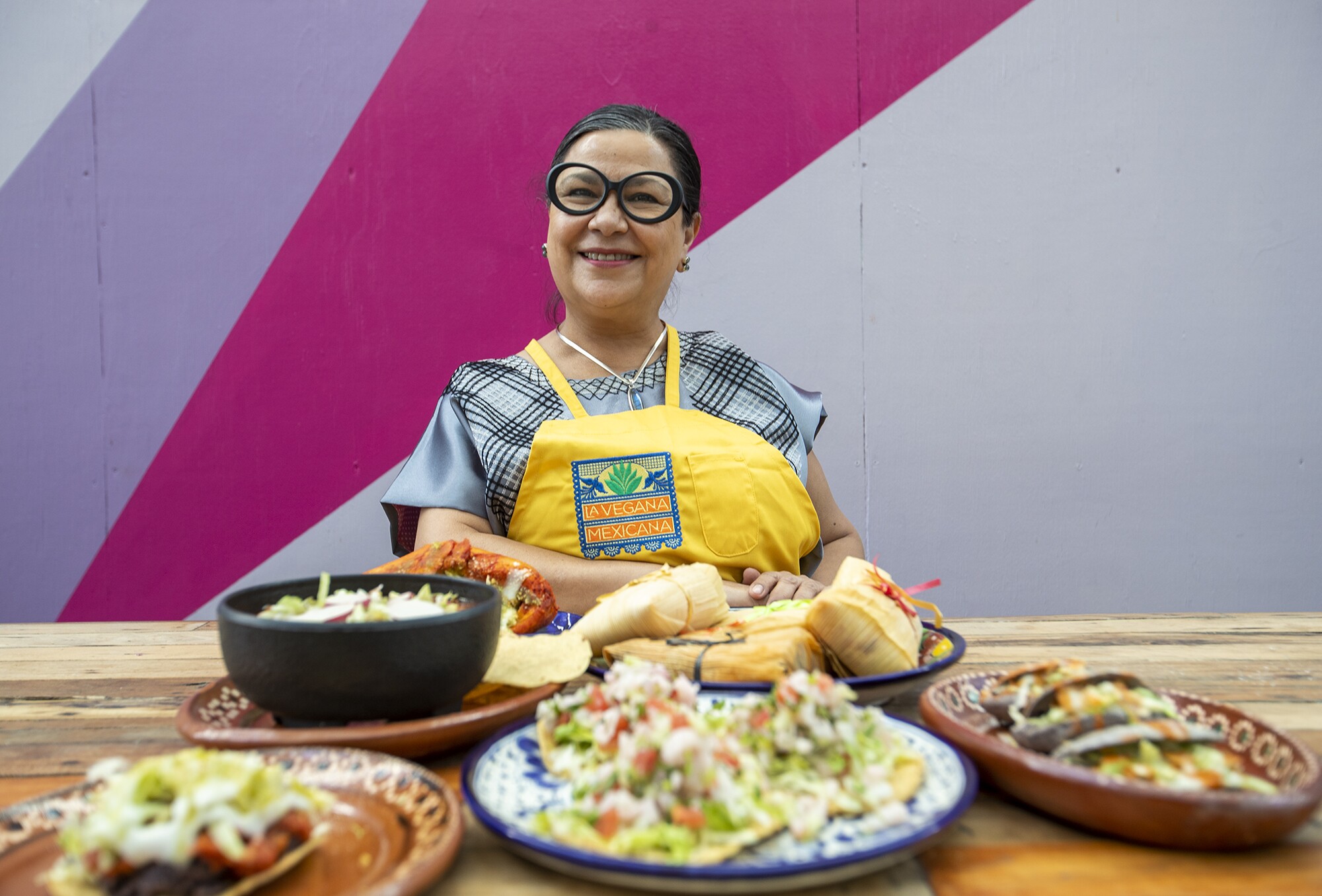
Loreta Ruiz is the owner of La Vegana Mexicana, a vegan Mexican food restaurant in Santa Ana.
(Scott Smeltzer / Staff Photographer)
Chef-owner Loreta Ruiz of La Vegana Mexicana, at Santa Ana’s 4th Street Market, said she was motivated by her daughter’s struggles with an autoimmune disease. Her daughter tried different diets to alleviate some of her symptoms and had success with a strict vegan and gluten-free diet.
“The problem we realized was there was not vegan food for us, no Mexican food. It was as if we were excluded from that,” said Ruiz.
Ruiz started to experiment with veganizing her own beloved Mexican recipes.
“It was challenging and there were a lot of attempts,” Ruiz said. “A lot of food that was not very good. I think that even the dog didn’t like it,” she laughs.
Eventually though, Ruiz achieved taste she was after. She sold her vegan tamales at vegan festivals and at bars and farmer’s markets, before opening La Vegana Mexicana in a stall at 4th Street Market in 2017.
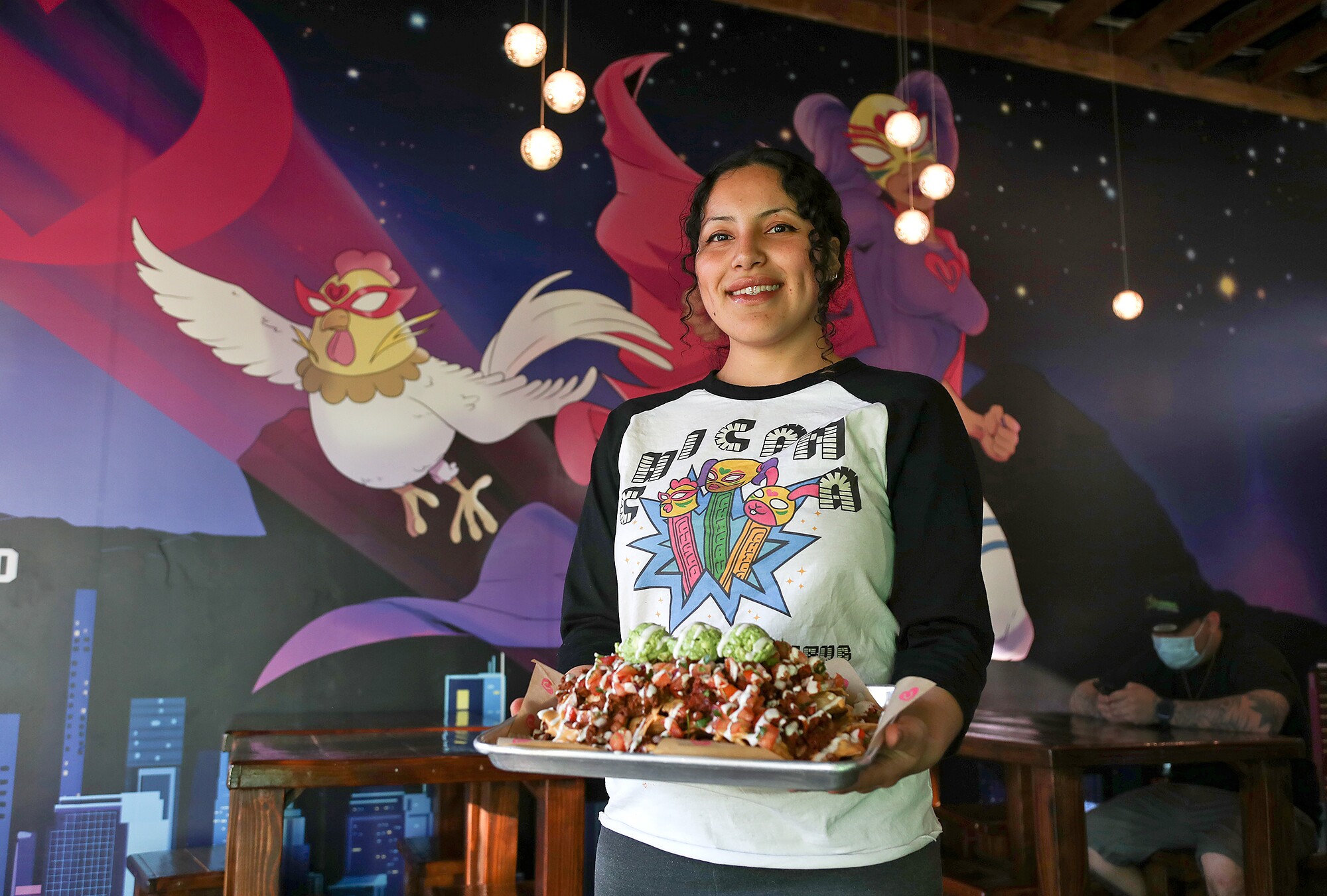
Jasmine Hernandez of Chicana Plant-based Grub in Fullerton holds a plate of the loaded nachos. Chicana serves a vegan Mexican food which is growing in popularity in Orange County.
(Don Leach / Staff Photographer)
In Fullerton, Chicana Plant-based Grub owner Jasmine Hernandez said her decision was morally motivated.
“It was an ethical choice that I made, personally,” said Hernandez.
Chicana has been woman-owned and family-operated since 2017, when Hernandez began the concept as a pop-up and moved onto a food truck before opening a brick-and-mortar location in her hometown. The restaurant, which features a mural of a pink and purple-clad luchadora rescuing piglets from a butcher shop, is inspired by her Cali-Mexican roots and passion for animal rights with a commitment to cruelty-free plant-based grub.
David Aguilar, who co-owns Vegan by El Zamorano in Costa Mesa with Julia Chavez, comes from a restaurant family. His parents own a traditional taqueria, Taqueria El Zamorano, in Santa Ana. But after going vegan more than six years ago, he found himself missing some of his favorite taqueria dishes so much he decided to recreate them without meat.
“I grew up in my parents taqueria so their menu, I just veganized it,” said Aguilar.
His vegan tacos, burritos and tortas were part of his weekly pop-up until he opened his own spot in 2020. Aguilar said his reasons for choosing a plant-based lifestyle are many.
“For the planet, for the animals, for the people, for health,” said Aguilar. “Another reason we do this is because there is a pretty big vegan community here in Southern California and everyone in Southern California loves Mexican food.”
Aguilar said when he started there were not many places combining the two.
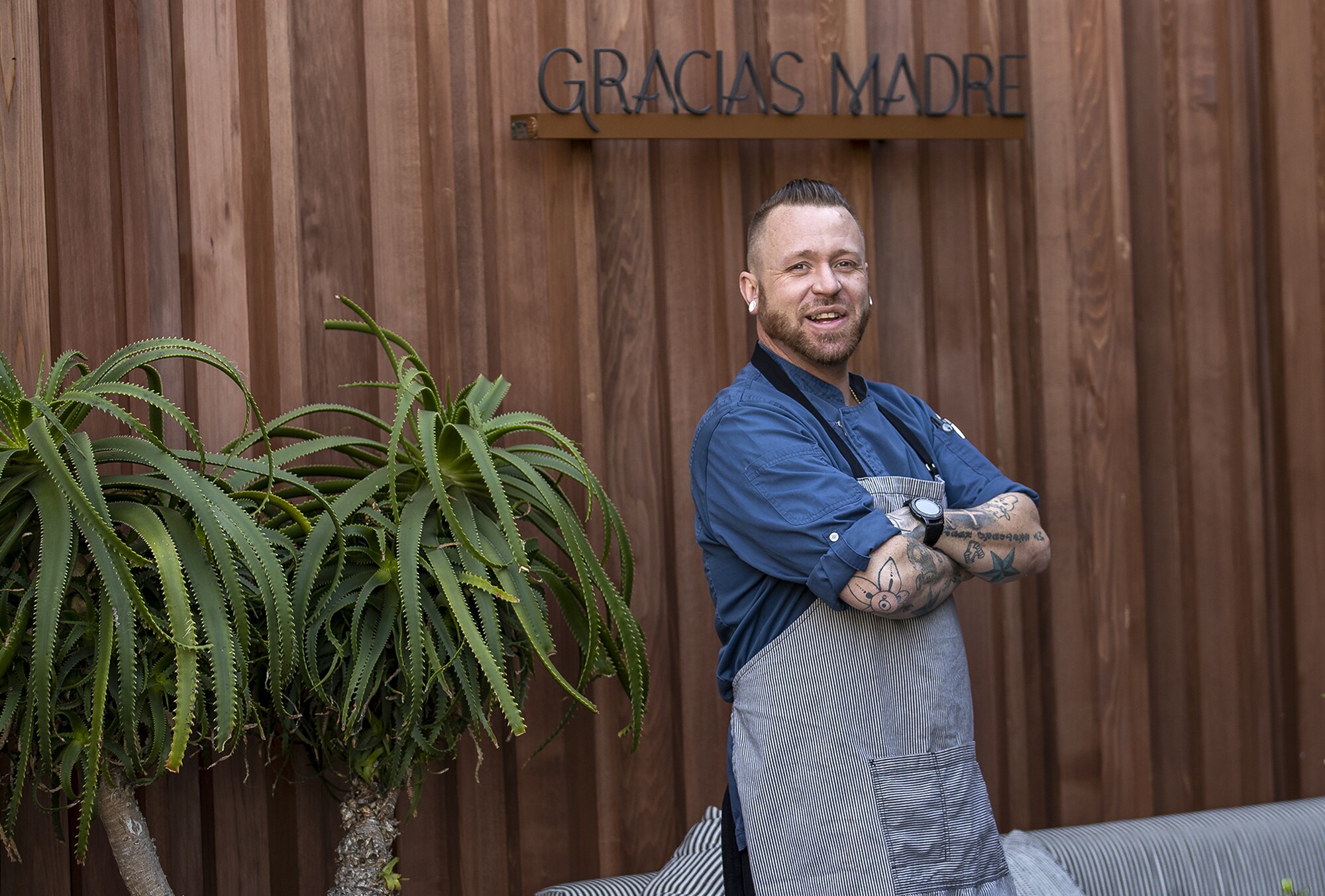
Justin Haefler is the executive chef at Gracias Madre.
(Scott Smeltzer / Staff Photographer)
Near the coast, Gracias Madre in Newport Beach is an extension of popular plant-based restaurant Café Gratitude and helmed by executive chef Justin Haefler. The restaurant serves vegan Mexican cuisine alongside craft cocktails, beer and wine.
Haefler has spent more than 10 years at the head of kitchens like Cha Cha’s and Rick Bayless’ Red O and also worked as a private chef for a client with a vegan diet and is happy to combine his knowledge of the two.
“My goal as the executive chef of Gracias Madre is to take those traditional techniques and traditional methods and use them to transform plant-based dishes,” said Haefler.
Shared outlook, varied output
Orange County has made space for a diverse collection of plant-based Mexican food options, and owners agree different concepts coexisting have a positive impact on the restaurants and their diners.
“Sometimes the lack of options allows people to serve mediocre food,” said Hernandez. “Now with time, everything is getting better and there is more competition, so the bars are a little higher.”
Aguilar agrees. “I feel like vegan and vegetarian food back in the day had a bad name, for being really gross,” she said, “and I feel like that might have been true. But now since veganism is growing so much and more people are cooking it, the odds of it being odds are increasing and there are a lot of good vegan restaurant now days.”
The menus at these restaurants are thoughtful and careful consideration of not only taste but presentation and texture has gone into how they have veganized their food.
At Chicana, Hernandez uses Impossible and Beyond patties in her burgers and cashew cheese and sour cream on nacho and sopes.
“It’s not for everyone, like some vegan people don’t like mock meats, so more and more everything is going to be constantly in an evolution of change,” said Hernandez. “But right now there is still a big window of opportunity to reach audiences that haven’t tried it. We are just a really good bridge for people to begin experimenting.”
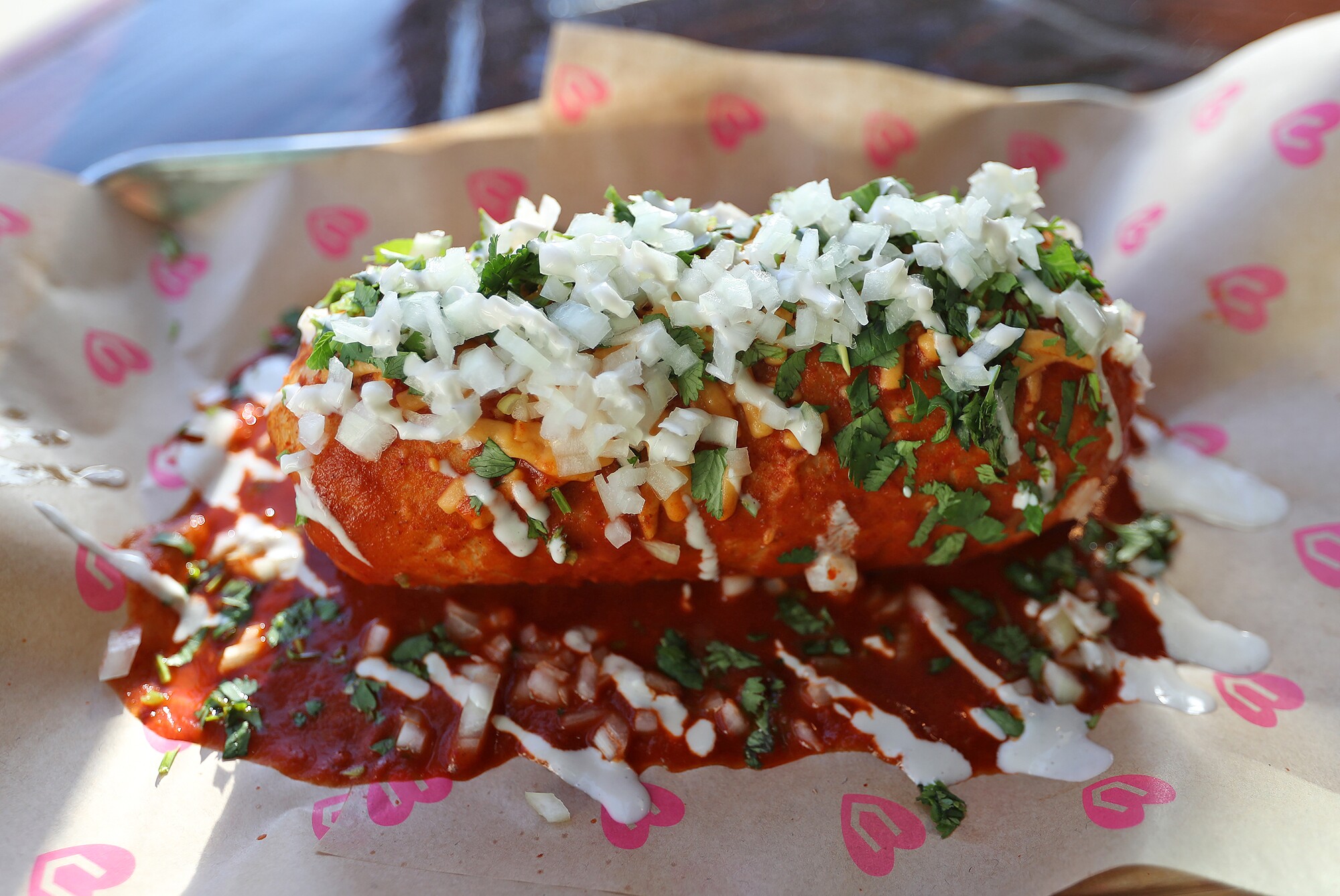
A classico burrito smothered in red sauce at Chicana Plant-based Grub in Fullerton. Chicana serves a vegan Mexican food which is growing in popularity in Orange County.
(Don Leach / Staff Photographer)
La Vegana Mexicana is best known for its vegan tamales, with flavors like strawberry, black bean mole and nopales and salsa verde. Ruiz uses a combination of different vegetable oils rather than the traditional manteca or lard made up of animal fat.
“We had to go through a lot of notes, just to measure and make sure we achieve a certain flavor,” Ruiz said.
Other popular dishes include the ceviche she makes using cauliflower in place of fish and the pozole she makes using mushrooms. New to the menu are the blue corn gorditas, which are stuffed with potato, lettuce, avocado and radish salad in lime vinaigrette with chile de árbol salsa.
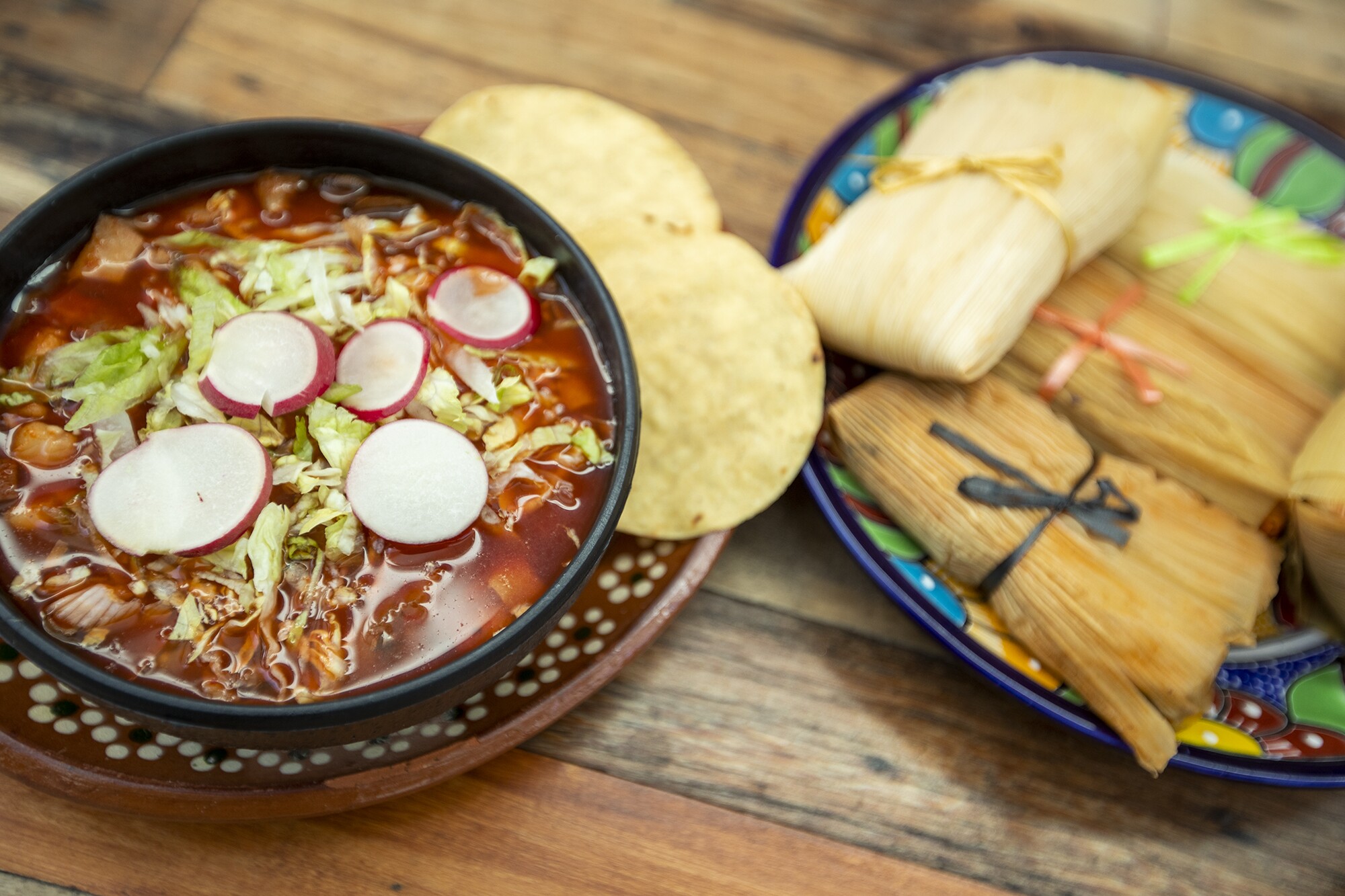
The mushroom pozole and an assortment of vegan tamales from La Vegana Mexicana in Santa Ana.
(Scott Smeltzer / Staff Photographer)
Vegan by El Zamorano makes all of its inventive vegan proteins in place of asada, al pastor and chicken in house.
“For some of them, we use soy or wheat, but we also use regular plants,” said Aguilar. “Mushrooms, cauliflower and the hibiscus flower. We have made that into a protein option.”
More commonly found in agua frescas drinks on Mexican food menus, Aguilar said his eatery uses the hibiscus flower by cooking it down.
“The flower is sautéed with garlic, onion and seasonings,” said Aguilar, “and if you were to order the hibiscus taco, it comes topped with onion, cilantro, pineapple, guacamole and salsa verde.”
Besides the in-house vegan “meats,” Vegan by El Zamorano also makes signature meltable cashew-based cheeses in flavors such as mozzarella and roasted jalapeño.
Gracias Madre also has house-made vegan cheese, like the one used in its queso fundido. A Oaxacan chili-infused cashew portobello cheese gets mixed with green onion and topped with vegan mozzarella.
“And you’ll even get that stretch like real cheese,” Haefler said while demonstrating a gooey cheese pull with a tortilla chip. “The fact that you can eat something that has zero dairy in it and still get the stretchiness of it, it’s like, mind blown.”
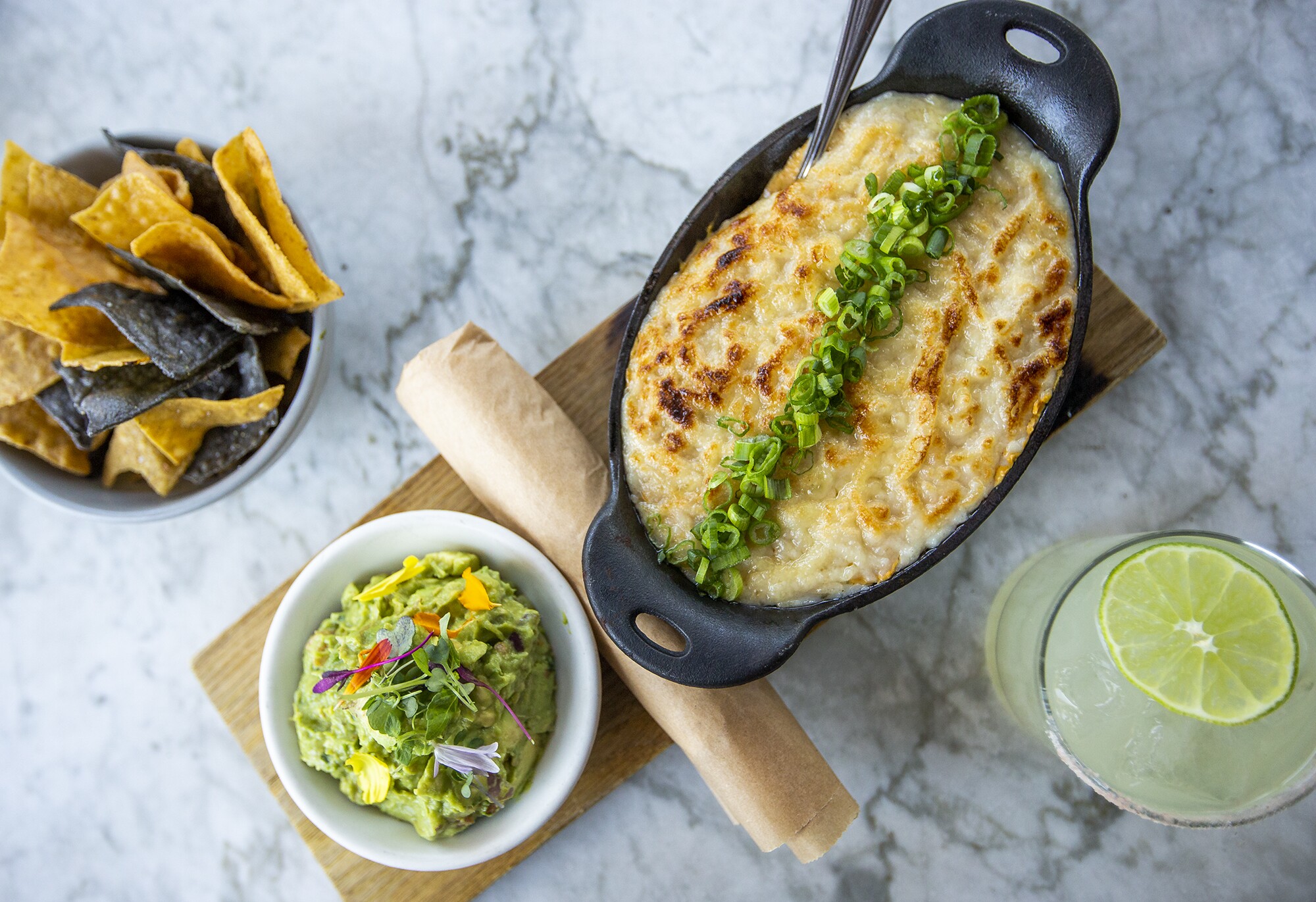
The queso fundido, Oaxacan chili-infused cashew portobello cheese and crispy mozzarella at Gracias Madre.
(Scott Smeltzer / Staff Photographer)
Haefler has also added a grilled street corn dish to Gracias Madre’s menu that uses toasted coconut or “follow your heart” vegan parmesan and a carnitas dish that replaces pork with braised jackfruit.
“Carnitas is one of those dishes that the more love you give it, the slower you cook it, the longer you cook it, the better it is,” Haefler said. “Just don’t overcook it!” he adds.
His version is slow-cooked for two hours, rendered crispy and served in a colorado guajilio sauce with orange, jicama and watermelon radish.
Tradition redefined
Some may regard plant-based Mexican cuisine as inauthentic due to the lack of meat.
Haefler said that attitude is misguided.
“I don’t think a protein makes Mexican food Mexican food,” Haefler said. “What makes it is the deep-rooted culture and deep-rooted history of the dishes.”
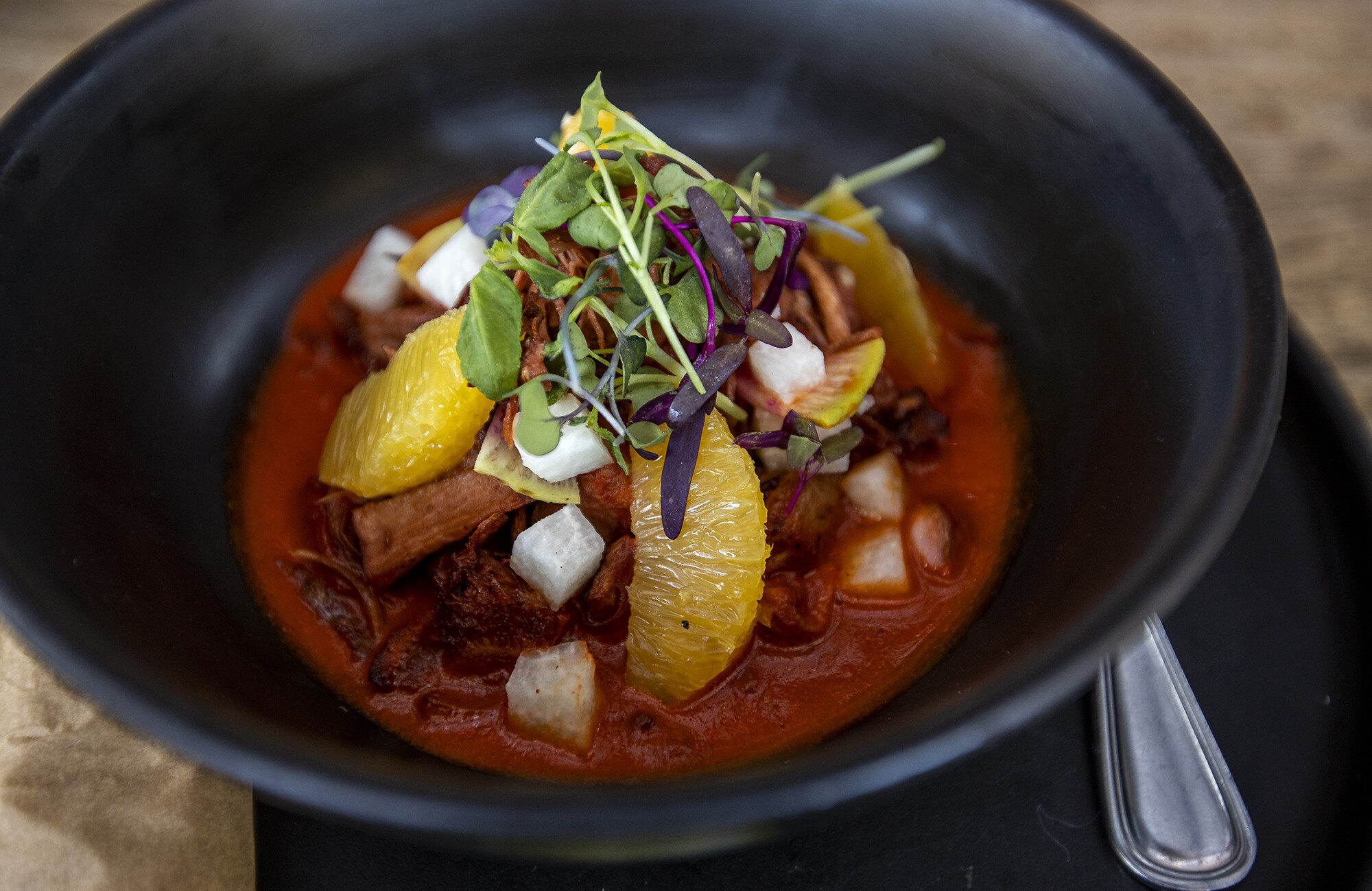
The carnitas, braised jackfruit with Colorado guajillo sauce, orange jicama, watermelon radish from Gracias Madre.
(Scott Smeltzer / Staff Photographer)
Ruiz expresses a similar sentiment.
“We are so proud of our culture and so proud of the food we grew up with,” said Ruiz. “At La Vegana, what I have tried to do is honor the traditional flavors and spices and the taste and the color and the texture, but with a vegan version.”
At Chicana, Hernandez draws on her own Mexican American experience to create a menu that resonates. “We are chicanos, and that really encompasses our whole identity,” Hernandez said.
While she grew up eating Mexican food at home, Hernandez also ate at diners and restaurants that weren’t Mexican, which is why you’ll find burgers alongside tortas, made with mock meats of course.
“My favorite thing to eat growing up was a bacon avocado cheeseburger, so we have the Cali Dreaming Burger on the menu,” said Hernandez.
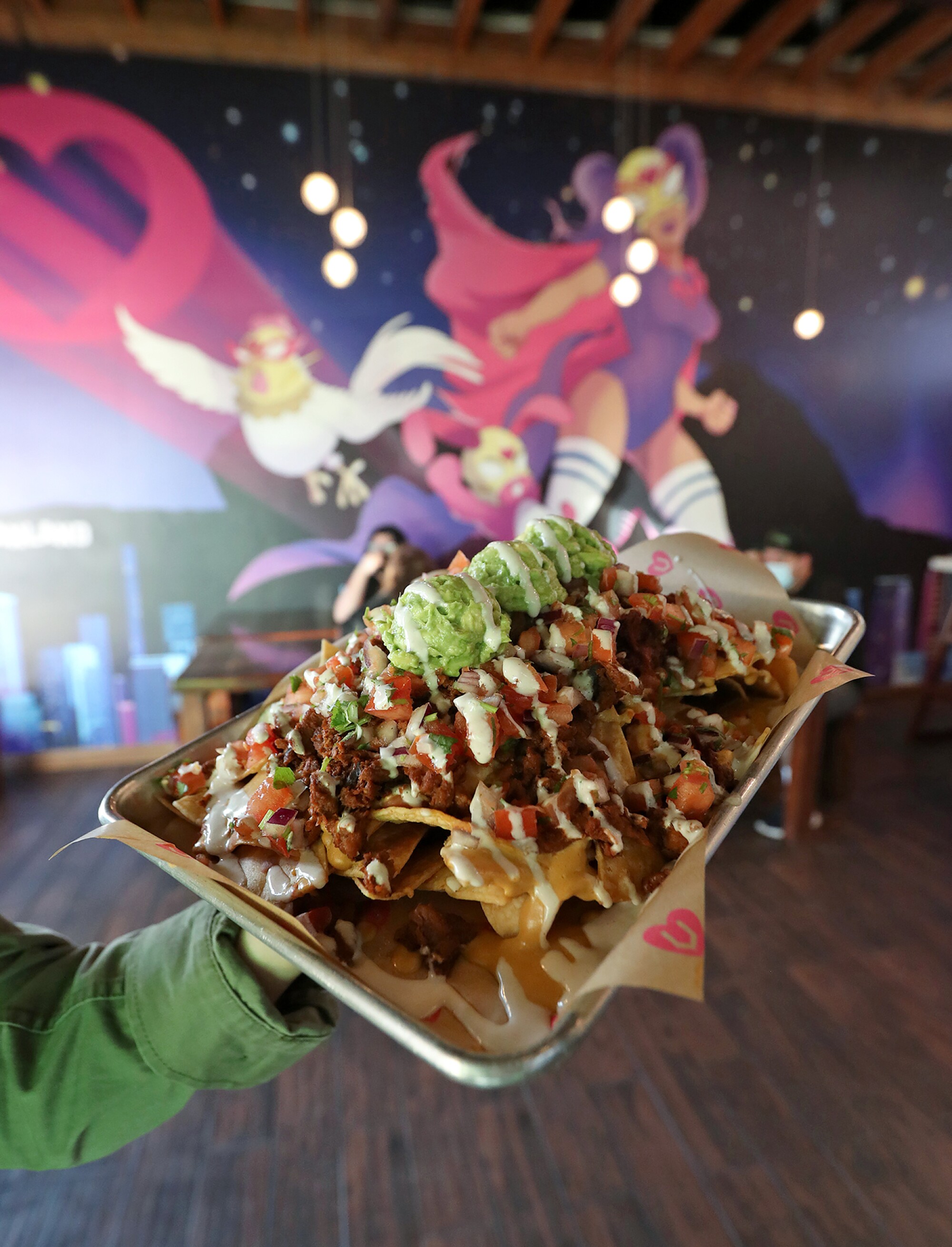
A meal fit for two of the loaded nacho plate at Chicana Plant-based Grub in Fullerton. Chicana serves vegan Mexican food, which is growing in popularity in Orange County.
(Don Leach / Staff Photographer)
Other popular dishes like asada fries and Korean tacos, listed on the menu as ‘Mexgogi’ may not be traditional Mexican dishes, but Hernandez said they are a part of her personal tradition.
“Everything is about being authentic to us, our experience. We are not trying to create elevated vegan food — it is very relatable food that we grew up culturally with,” Hernandez said.
And just as Orange County’s plant-based Mexican establishments have different reasons for starting, their customers have different reason for eating it.
“We have a lot customers that really appreciate what we do. Not because only because they are vegan, but because they have allergies or they cannot eat processed food or soy,” said Ruiz. “It makes you feel good to get to eat [Mexican food] again.”
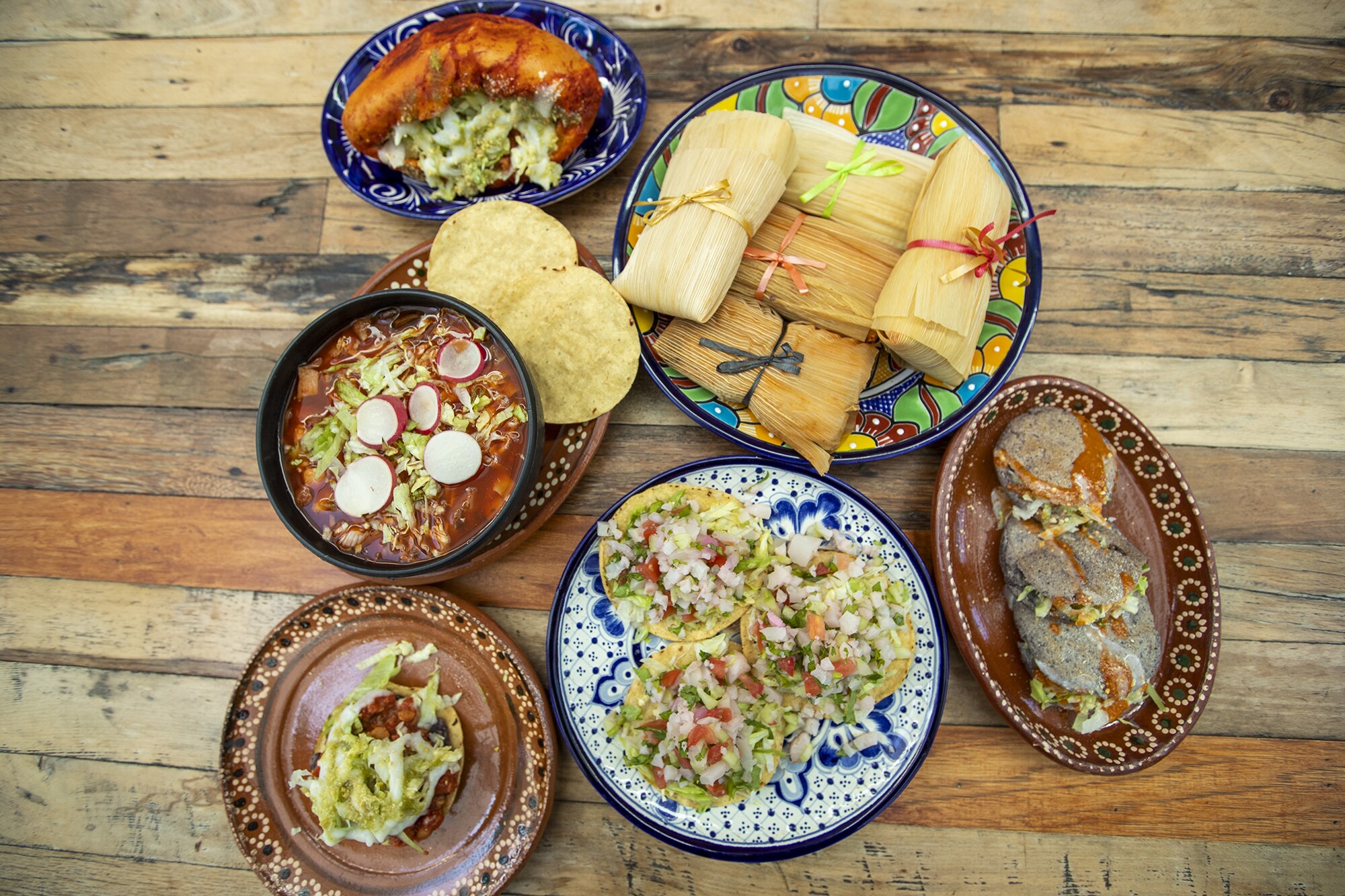
An assortment of vegan Mexican food from La Vegana Mexicana in Santa Ana.
(Scott Smeltzer / Staff Photographer)
Haefler said he also tries to be mindful of guests with other dietary restrictions beyond just meat.
“I will modify or alter a dish because it is about building guests for life,” said Haefler.
Orange County’s meatless Mexican movement is challenging the idea that a version of traditional food that deviates from the tradition isn’t void of authentic flavor.
Minds are changing, even within the culture.
Aguilar, for example, said his parents were unsure about his vegan taqueria idea — at first.
“They are extremely supportive, though I think at first they were a little skeptical,” said Aguilar. “But seeing how many people walk through these doors and seeing the demand for it, they are very supportive.”
Hernandez said she has observed a turn in the tide as well.
“Our demographic is a little younger, but lately I have seen a lot more people coming in that are bringing their parents and their grandmother, and they enjoy it,” said Hernandez.
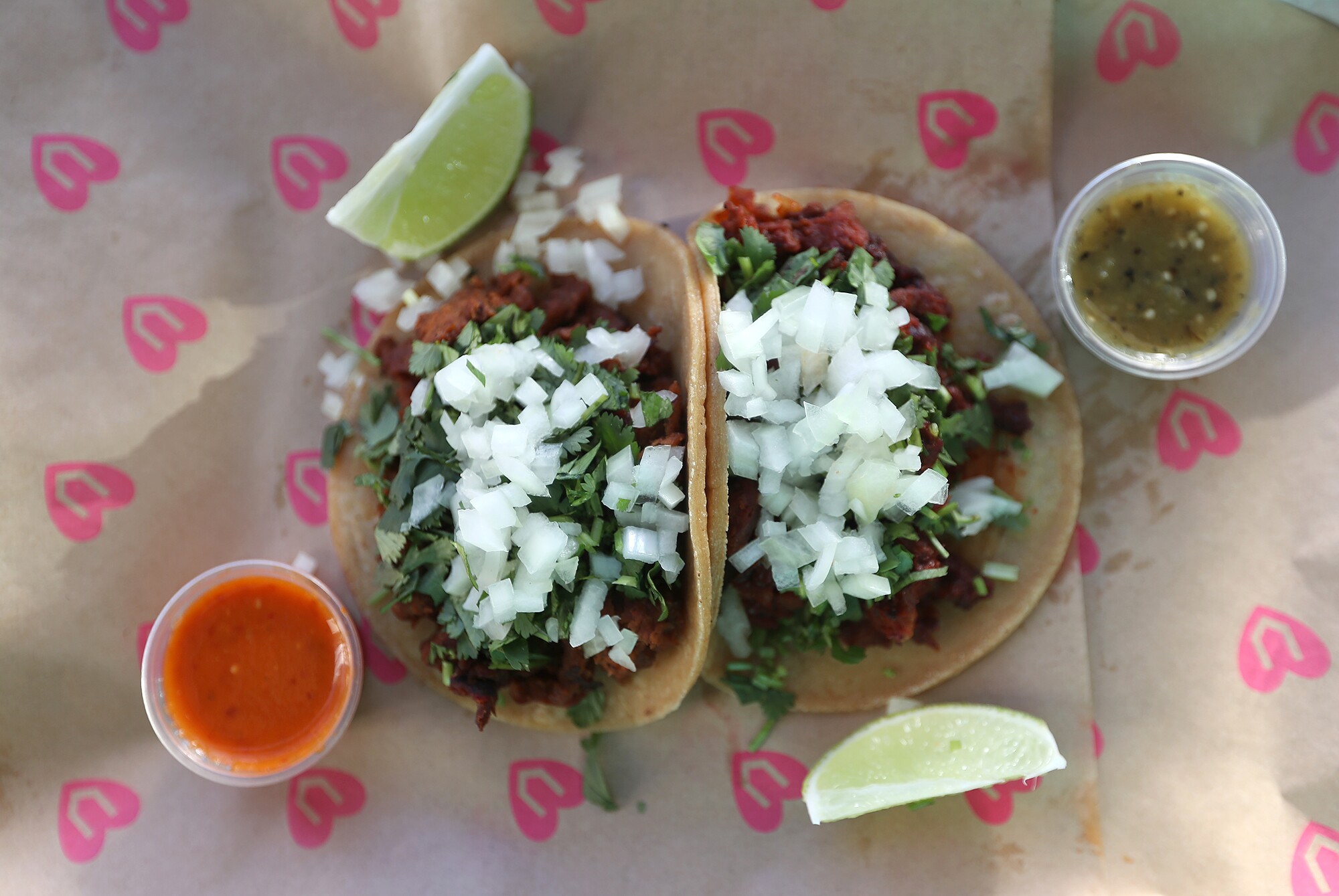
The street taco plate at Chicana Plant-based Grub in Fullerton.
(Don Leach / Staff Photographer)
The movement also has momentum.
Chicana is expanding this year into the unit next door to its current location, with plans to make the space a beer bar.
“Our space is really small now, and this is just going to create a better experience,” said Hernandez. “We want people to have a drink or cocktail and vibe and have a good time with good food.”
Gracias Madre offers brunch on Sundays and has plans to roll out lunch service soon too. Haefler also predicts expansion in the vegan arena beyond his kitchen.
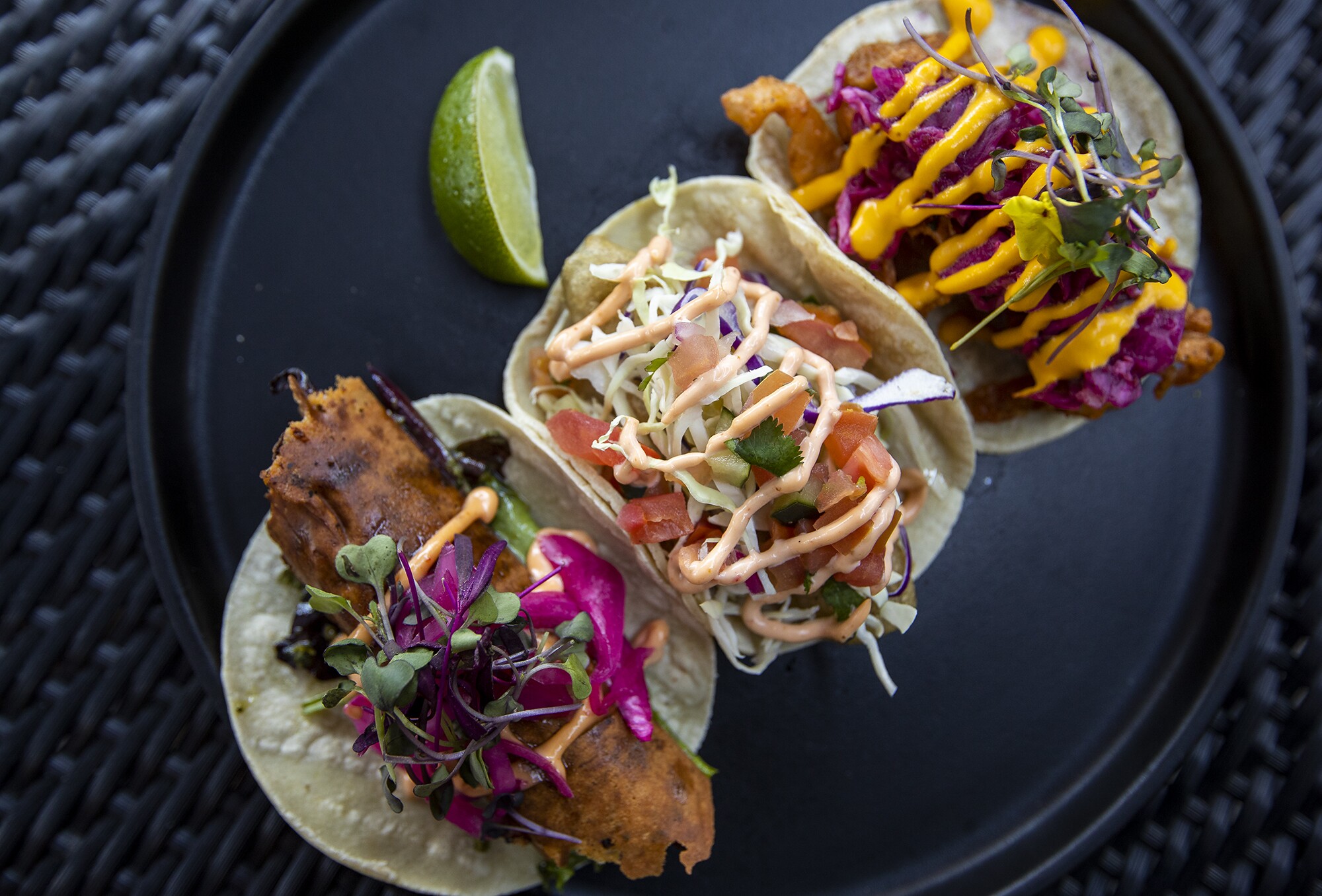
The parm pastor, the mushroom taco and the fried coconut taco from Gracias Madre.
(Scott Smeltzer / Staff Photographer)
“I see the future and I see the growth potential,” said Haefler. “I would say in the next 25 years, 50 percent of the restaurants are going to be plant-based in some way or form. We are setting up a movement that is going to change the food industry.”
Ultimately, Ruiz said the movement is about taking the time to nourish each other in a way that protects us all.
“I think in our culture, we do everything around food, that is where we find comfort,” said Ruiz, “and that is how we show love — with food.”






More Stories
The Most Affordable Royal Engagements of All Time (Russian Focus)
How the Condition of Lights, Signals, and Electronics Influence Selling My Car Online in Dripping Springs TX
The History And Origins of Potatoes and Potato Soup